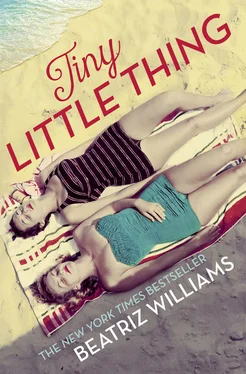
Published by HarperCollins Publishers Ltd
1 London Bridge Street
London, SE1 9GF
www.harpercollins.co.uk
First published by Penguin Group USA 2016
First published in the UK by Harper 2016
Copyright © Beatriz Williams
Cover design by Alexandra Allden © HarperCollinsPublishers Ltd 2016
Cover photographs © H. Armstrong Roberts/Getty Images (front); Shutterstock.com(all other images).
Beatriz Williams asserts the moral right to be identified as the author of this work.
A catalogue copy of this book is available from the British Library.
This novel is entirely a work of fiction. The names, characters and incidents portrayed in it are the work of the author’s imagination. Any resemblance to actual persons, living or dead, events or localities is entirely coincidental.
All rights reserved under International and Pan-American Copyright Conventions. By payment of the required fees, you have been granted the non-exclusive, non-transferable right to access and read the text of this e-book on screen. No part of this text may be reproduced, transmitted, down-loaded, decompiled, reverse engineered, or stored in or introduced into any information storage and retrieval system, in any form or by any means, whether electronic or mechanical, now known or hereinafter invented, without the express written permission of HarperCollins.
Source ISBN: 9780008134938
Ebook Edition © December 2016 ISBN: 9780008134945
Version: 2016-10-27
To all those who return from war not quite whole and to the people who love them
Contents
Cover
Title Page
Copyright
Dedication
Tiny, 1966: Cape Cod, Massachusetts
Caspian, 1964: Boston
Tiny, 1966
Caspian, 1964
Tiny, 1966
Caspian, 1964
Tiny, 1966
Caspian, 1964
Tiny, 1966
Caspian, 1964
Tiny, 1966
Caspian, 1964
Tiny, 1966
Caspian, 1964
Tiny, 1966
Caspian, 1964
Tiny, 1966
Caspian, 1964
Tiny, 1966
Caspian, 1964
Tiny, 1966
Caspian, 1964
Tiny, 1966
Caspian, 1964
Tiny, 1966
Caspian, 1964
Tiny, 1966
Caspian, 1964
Mrs. Vivian Schuyler, 1966
Tiny, 1966
Pepper, 1966
Acknowledgments
Keep Reading …
About the Author
Also by Beatriz Williams
About the Publisher
Tiny, 1966
CAPE COD, MASSACHUSETTS
The first photograph arrives in the mail on the same day that my husband appears on television at the Medal of Honor ceremony. It’s accompanied by the customary note written in block capital letters. By now, I know enough about politics—and about my husband’s family, I suppose—to suspect this isn’t a coincidence.
There’s no return address (of course, there wouldn’t be, would there?), but the envelope was postmarked yesterday in Boston, and the stamps are George Washington, five cents each. A plain manila envelope, letter size, of the sort they use in offices: I flip it back and forth between my fingers, while my heart bounds and rebounds against my ribs.
“Tiny, my dear.” It’s my husband’s grandmother, calling from the living room. “Aren’t you going to watch the ceremony?”
She has a remarkable way of forming a sociable question into a court summons, and like a court summons, she can’t be ignored. I smooth my hand against the envelope once, twice, as if I can evaporate the contents— poof, presto! —in the stroke of a palm, and I slide it into one of the more obscure pigeonholes in the secretary, where the mail is laid every day by the housekeeper.
“Yes, of course,” I call back.
The television has been bought new for the occasion. Generally, Granny Hardcastle frowns on modern devices; even my husband, Franklin, has to hide in the attic in order to listen to Red Sox games on the radio. The wireless, she calls it, a little disdainfully, though she’s not necessarily averse to Sinatra or Glenn Miller in the evenings, while she sits in her favorite chintz chair in the living room and drinks her small glass of cognac. It drowns out the sound of the ocean, she says, which I can never quite comprehend. In the first place, you can’t drown out the ocean when it flings itself persistently against your shore, wave after wave, only fifty yards past the shingled walls of your house, no matter how jazzy the trumpets backing up Mr. Sinatra.
In the second place, why would you want to?
I pause at the tray to pour myself a glass of lemonade. I add a splash of vodka, but only a tiny one. “Have they started yet?” I ask, trying to sound as cool as I look. The vodka, I’ve found, is a reliable refrigerant.
“No. They’re trying to sell me Clorox.” Granny Hardcastle stubs out her cigarette in the silver ashtray next to her chair—she smokes habitually, but only in front of women—and chews on her irony.
“Lemonade?”
“No, thank you. I’ll have another cigarette, though.”
I make my way to the sofa and open the drawer in the lamp table, where Mrs. Hardcastle keeps the cigarettes. Our little secret. I shake one out of the pack and tilt my body toward the television set, feigning interest in bleach, so that Franklin’s grandmother won’t see the wee shake of my fingers as I strike the lighter and hold it to the tip of the cigarette. These are the sorts of details she notices.
I hand her the lit cigarette.
“Sit down,” she says. “You’re as restless as a cat.”
There. Do you see what I mean? Just imagine spending the summer in the same house with her. You’d be slipping the vodka into your lemonade in no time, trust me.
The French doors crash open from the terrace.
“Has it started yet?” asks one of the cousins—Constance, probably—before they all clatter in, brown limbed, robed in pinks and greens, smelling of ocean and coconuts.
“Not yet. Lemonade?”
I pour out four or five glasses of lemonade while the women arrange themselves about the room. Most of them arrived as I did, at the beginning of summer, members of the annual exodus of women and children from the Boston suburbs; some of them have flown in from elsewhere for the occasion. The men, with a few exceptions, are at work—this is a Wednesday, after all—and will join us tomorrow for a celebratory dinner to welcome home the family hero.
I pour a last glass of lemonade for Frank’s four-year-old niece Nancy and settle myself into the last remaining slice of the sofa, ankles correctly crossed, skirt correctly smoothed. The cushions release an old and comforting scent. Between the lemonade and the ambient nicotine and the smell of the sofa, I find myself able to relax the muscles of my neck, and maybe one or two in my back as well. The television screen flickers silently across the room. The bottle of bleach disappears, replaced by Walter Cronkite’s thick black eyeglass frames, and behind them, Mr. Cronkite himself, looking especially grave.
“Tiny, dear, would you mind turning on the sound?”
I rise obediently and cut a diagonal track across the rug to the television. It’s not a large set, nor one of those grandly appointed ones you see in certain quarters. Like most of our caste, Mrs. Hardcastle invests lavishly in certain things, things that matter, things that last—jewelry, shoes, houses, furniture, the education of the next generation of Hardcastles—and not in others. Like television sets. And food. If you care to fasten your attention to the tray left out by the housekeeper, you’ll spy an arrangement of Ritz crackers and pimiento spread, cubes of American cheese and small pale rubbery weenies from a jar. As I pass them by, on my return journey, I think of my honeymoon in the south of France, and I want to weep.
Читать дальше














